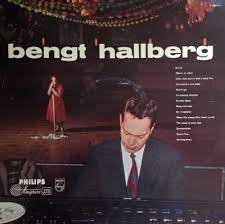
Daily Dose Of Jazz…
Bengt Hallberg was born on September 13, 1932 in Gothenburg, Sweden and studied classical piano from an early age. He wrote his first jazz arrangement at the age of 13. By 15 he recorded his first record as a member of a group led by bassist Thore Jederby and in 1949 he recorded with the Swedish alto saxophonist Arne Domnérus for the first time. The two musicians continued to play together for several decades.
During the Fifties, Bengt played with leading visiting American musicians tenor saxophonist Stan Getz and altoist Lee Konitz in 1951, and trumpeters Clifford Brown and Quincy Jones in 1953. During the same period he worked with Swedish baritone saxophonist Lars Gullin.
Hallberg had a versatile style and in his later years he wrote music for film and television, as well as choral arrangements. With Domnerus and Georg Riedel among others, he participated in the Jazz at the Pawnshop sessions in 1976.
Pianist, composer and arranger Bengt Hallberg, who also played accordion, transitioned on July 2, 2013 from congestive heart failure at the age of 80 in Uppsala, Sweden.
More Posts: arranger,bandleader,composer,history,instrumental,jazz,music,piano
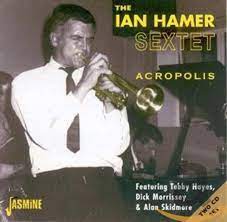
Daily Dose Of Jazz…
Ian Wilfred Hamer was born on September 11, 1932 in Liverpool, England, the son of a successful Merseyside dance band leader. Together with his two brothers he played in the band run by his mother until serving in the Royal Air Force.
Moving to London, England in 1953 he worked for clarinettist Carl Barriteau and for a brief period with the Oscar Rabin Band. For a year beginning in 1955 he was part of the Tubby Hayes octet then later joined the Vic Ash quintet. In 1963, together with Harry South, he led a band called The Six Sounds, featuring Ken Wray and Dick Morrissey. By 1966 the band had developed into the Ian Hamer Sextet. In 1966 Ian joined the Top of the Pops studio orchestra conducted by Johnny Pearson.
Hamer played in big bands led by Tubby Hayes, Ted Heath, Mike Gibbs, Jack Parnell and Harry South. He also played with Kenny Wheeler, Dizzy Gillespie, Ella Fitzgerald, as well as in smaller bands with Stan Tracey, Benny Golson, Lalo Schifrin, Gary McFarland, Woody Herman’s Anglo-American Herd, Barbara Thompson, the Thad Jones-Mel Lewis band, Eric Delaney, John Dankworth and Joe Harriott.
As a session musician, he played on recordings by The Beatles, Bing Crosby, Tom Jones, Dusty Springfield, Shirley Bassey, Barbra Streisand, James Last, Matt Monro, and Peter Herbolzheimer. Ian played trumpet on the theme tune for The Sweeney, written and arranged by Harry South.
In 1987, Hamer moved to Brighton, England and founded the group Ian Hamer and the Sussex Youth Jazz Orchestra, later dropping Youth. On September 3, 2006, trumpeter Ian Hamer transitioned in Brighton at 73.
More Posts: bandleader,history,instrumental,jazz,music,trumpet
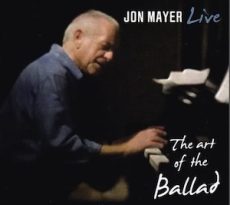
Daily Dose Of Jazz…
Jon Mayer was born September 7, 1938 in New York City and grew up in the fertile modern jazz evolution. Learning piano in childhood he confidently expresses strong emotions in his playing.
He also spent time in the Thad Jones-Mel Lewis Band as well as on the road with Dionne Warwick, Sarah Vaughan, Anita O’Day and Manhattan Transfer. Mayer’s compositions have been recorded by Les McAnn, Barry White’s Love Unlimited Orchestra, Nancy Wilson, Gladys Knight, Ernie Watts and Jackie Ryan.
He has recorded eleven albums as a leader and two as a sideman, Strange Blues with Jackie McLean and Like Sonny with John Coltrane.
Pianist and composer Jon Mayer continues a career as a performer.More Posts: bandleader,composer,history,instrumental,jazz,music,piano
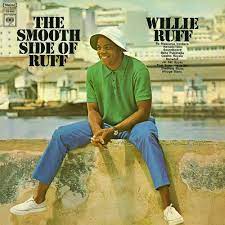
Daily Dose Of Jazz…
Willie Henry Ruff Jr. was born September 1, 1931 in Sheffield, Alabama. He attended the Yale School of Music earning his Bachelor and Masters of Music by 1954.
He first met Dwike Mitchell in 1947 when they were teenaged servicemen stationed at the former Lockbourne Air Force Base in Ohio. Mitchell recruited Ruff to play bass with his unit band for an Air Force radio program. The two of them went on to later play in Lionel Hampton’s band but left in 1955 to form their own group, the Mitchell-Ruff Duo. They played as a second act to artists such as Louis Armstrong, Count Basie, Duke Ellington, and Dizzy Gillespie.
From 1955 to 2011 the duo regularly performed and lectured throughout the United States, Asia, Africa, and Europe. The Mitchell-Ruff Duo was the first jazz band to play in the Soviet Union in 1959 and in China in 1981. Chosen by John Hammond to be the bass player for the recording sessions of Songs of Leonard Cohen, an album first released in 1967. During those sessions, he and Cohen laid down the bed tracks for most of the songs on the album.
He is one of the founders of the W. C. Handy Music Festival in Florence, Alabama, was a faculty member at the Yale School of Music from 1971 until his retirement in 2017, teaching music history, ethnomusicology, and arranging. Willie was a founding Director of the Duke Ellington Fellowship Program at Yale, held a visiting appointment at Duke University, where he oversaw the jazz program and directed the Duke Jazz Ensemble and was on the faculty at UCLA and Dartmouth.
Over the course of his career he recorded as a soloist, in a duo and as a sideman with Quincy Jones, Bobby Hutcherson, Gil Evans, Benny Golson, Milt Jackson, Lalo Schifrin, Sonny Stitt, Clifford Coulter, Miles Davis and Jimmy Smith.
French horn and double bassist Willie Ruff, who played in the Mitchell-Ruff Duo with pianist for over 50 years, was inducted into the Alabama Jazz Hall of Fame, and has published his memoir A Call to Assembly: The Autobiography of a Musical Storyteller, is retired at 91.
More Posts: bandleader,bass,french horn,history,instrumental,jazz,music
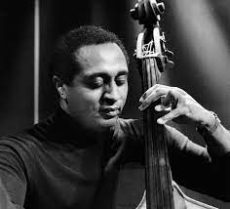
Three Wishes
Reggie Johnson was asked by Nica of his three wishes if granted and what he answered with these three:
- “The first one would be to have the bass that I want – that’s a full-sized bass.”
- “And, well, the next would be to have my own group, and…”
- “To play with Miles would be the third! That’s all I want.”
*Excerpt from Three Wishes: An Intimate Look at Jazz Greats ~ Compiled and Photographed by Pannonica de Koenigswarter
More Posts: baroness,bass,history,instrumental,jazz,music,pannonica,three,wishes



